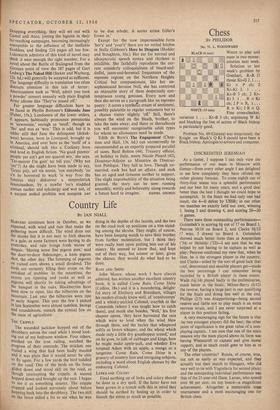Chess
BY PHILIDOR
No. 71. L. WOODWARD
BLACK (6 men)
WHITE (lb men)
WHITE to play and mate in two moves: solution next week.
Solution to last week's problem by Goethart. R–R 31 threat Kt–Q 2. 1 ... Kt x P ch; 2 Kt–Kt 3. 1 . . . Kt–B 3 ch; 2 Kt– Kt 5. 1 R x Kt ch; 2 P x R. 1 .
R x Kt; 2 B x Q. Fine cross-checker, variation I . . . Kt–B 3 ch; unpinning W Kt and blocking the line of action of Black bishop is particularly good.
Problem No. 69 (Garaza) was misprinted; the Knight on Black's Q Kt 8 should have been a Black bishop. Apologies to solvers and composer.
DISCREDITED JEREMIAH
As a tipster, I suppose I can only view the performance of our team in Moscow with dismay—from every other angle I am delighted to see how completely they have refuted my rather gloomy forecast. To come eighth out of thirty-four teams was a splendid performance and our best for many years, and a good deal better than the best I thought we could hope to accomplish. In the finals we had only one bad result, the 4-0 defeat by USSR; in our other ten matches we exactly held our own, winning 3, losing 3 and drawing 4, and scoring 20-20 in games.
There were three outstanding performances- Golombek's in scoring 8i out of 17 on Board 1, Penrose 10/16 on Board 2, and Clarke 902 (7 wins, 5 draws) on Board 4. Golombek showed much better form than at Amsterdam ('54) or Helsinki ('52)—I am sure that he was helped by not having to be captain as well as play; Penrose confirmed my view that, when he likes, he is the strongest player in the country, and Clarke—aided by the sort of good luck that cool, determined and sensible players get—made the best percentage I can remember being recorded by a British player in these events Wade (604) played badly in the preliminaries, much better in the finals; Milner-Barry (6/12) the reverse, having a large part in our qualifying for the finals and doing less well at the end. Phillips (2/5) was disappointing—being second reserve and liable not to play much is an extra nervous strain, and 1 am never surprised at a player in this position failing.
A very encouraging sign for the future is that the two youngest players did the best; the other point of significance is the great value of a non- playing captain. I am sure that one of the main reasons why the team played above its form was having Wheatcroft to captain and give moral support, and as much credit goes to him as to any of the players.
The other countries? Russia, of course, won, but not as easily as was expected, and they actually lost their match to Hungary, who did very well to tie with Yugoslavia for second place; and the outstanding individual performance was that of the 21-year-old Dane, Larsen, who scored over 80 per cent. on top board—a magnificent achievement. Altogether a memorable team tournament and a most encouraging one for British chess.










































 Previous page
Previous page